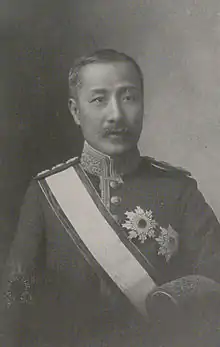Song Byeong-jun
Song Byeong-jun (Korean:송병준, hanja:宋秉畯, August 20, 1857 – February 1, 1925) was a Korean Joseon dynasty politician, noted for his role in the Japan–Korea Treaty of 1910. His clan was the Eunjin Song clan.[1] His literary name was Jeam (제암;濟庵).[2]
Song Byeong-jun | |
|---|---|
 Song Byeong-jun in 1910 | |
| Born | August 20, 1857 Changjin County, Korea |
| Died | February 1, 1925 (aged 67) Seoul, Korea |
| Other names |
|
| Occupation | Korean politician |
Biography
Song was born in Changjin County of Hamgyong Province in what is now South Hamgyong Province, North Korea. He was an eighth-generation descendant of the famous Neo-confucian philosopher Song Si-yeol, albeit from an illegitimate line as his mother was a Kisaeng.[1] Despite the handicap of his birth, he passed the Korean Imperial Examination in 1871 and obtained a post at the Board of Examination in 1873. Following the failure of the Gapsin Coup of 1884, he went to Japan intending to assassinate Enlightenment Party leader Kim Ok-gyun, but was instead won over to the pro-reform movement by Kim and his followers. On his return to Korea, Song was arrested on suspicion of collaboration with the Enlightenment Party, and although soon released, he continue to face ongoing official harassment, and returned to Japan again, where he adopted the Japanese name of Noda Heijiro (野田 平次郞).
Song returned to Korea in 1904 as an interpreter for the Imperial Japanese Army during the Russo-Japanese War. He was one of the founders of the Iljinhoe, a pro-Japanese political society promoting the merger of Korea and Japan, and which was instrumental in bringing about the Japan–Korea Treaty of 1910. From 1907, he served as Minister of Agriculture, Commerce and Industry in the last cabinet of Emperor Gojong. Following the annexation of Korea, Song was awarded the Japanese kazoku peerage title of viscount (shishaku) and a seat in the House of Peers of the Diet of Japan. He later served on the Central Advisory Institute of the Government-General of Korea, and his title was subsequently raised to count (hakushaku).
Under the Special law to redeem pro-Japanese collaborators' property enacted in 2005, property[3] of the descendants of nine people who had collaborated when Korea was annexed by Japan, including Song Byeong-jun, was confiscated by the South Korean government.[4]
References
- "송병준 - Daum 백과사전" (in Korean). 100.daum.net. Retrieved May 4, 2013.
- "네이트 한국학". Koreandb.nate.com. June 9, 2009. Archived from the original on December 15, 2013. Retrieved May 4, 2013.
- Committee OKs Seizure of Collaborators’ Property Archived June 17, 2008, at the Wayback Machine The Chosun Ilbo,December 7, 2005
- South Korea: Crackdown On Collaborators The New York Times, December 24, 2007
- "한국고전종합DB". db.itkc.or.kr. Retrieved April 18, 2022.
External links
- "송병준 - Daum 백과사전" (in Korean). 100.daum.net. Retrieved May 4, 2013.
- "민족문화대백과사전". Encykorea.aks.ac.kr. Retrieved May 4, 2013.